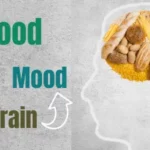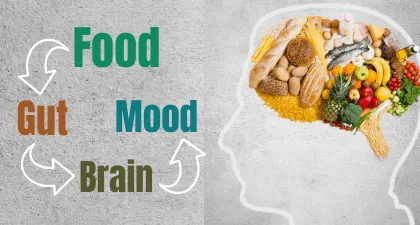Did you know that what you eat has a direct impact on your mental health, and can even contribute to disorders such as depression, anxiety, and ADHD?
(Note: This blog is for educational purposes only. Please consult a specialist to determine your individual nutritional/dietary needs.)
We’ve known for some time that exercise has a positive effect on mental health. Now there’s equally convincing proof that what we eat can in large part contribute to how we feel, too. A growing field of study called Nutritional Psychiatry is making some amazing discoveries regarding the link between nutrition and mental health.
Brain Size Responds to Nutrition
One of the most surprising discoveries is that what you eat directly impacts the size of your brain. An Australian study used magnetic resonance imaging (MRI) scans to measure the hippocampal volume size of older adults (ages 60-64) who either followed healthy eating patterns or unhealthy eating patterns. After only four years, the group that followed unhealthy eating habits had at least a 26 cubic millimeter smaller volume of their left hippocampal region than when they started the study. On the other hand, the healthy eaters gained at least 22.8 cubic millimeters in their brain’s left hippocampal region. These outcomes were independent of factors such as gender, education, depressive symptoms and medication, physical activity, smoking, hypertension, and diabetes. (BMC Medicine, Vol. 13(21), 2015)
To make this even more relevant to mental health, hippocampal atrophy (shrinkage) is the most common structural brain finding seen in mood disorders. In MRI studies, individuals with depressive disorders had an average 8 percent decrease in left hippocampal volume and a 10 percent decrease in the right volume. The extent of time of untreated depression also correlates strongly with hippocampal volume loss. (American Journal of Psychiatry, Vol. 161(11), 2015). Hippocampal atrophy is also commonly seen in people with post-traumatic stress syndrome (PTSD). Several studies have shown that individuals with PTSD have hippocampal volumes that are approximately 6–7 percent smaller than the normal population.
Junk Food Leads to More Depression and ADHD
The next time you reach for that bag of chips and soda, think again. Study after study has shown that consumption of junk food and fast food leads to higher rates of depression. One study of 9,000 adults found that those who regularly ate fast food and commercial baked goods experienced up to a 40 percent higher rate of depression. (Public Health Nutrition, Vol. 15(3), 2012). The authors concluded that the culprits were high levels of fat and trans-fatty acids that are known to cause oxidative damage and inflammation, negatively affecting the brain and cognitive ability. In another study of 120 children and adolescents, consuming fast food, sugar, and soft drinks was associated with a higher prevalence of diagnosed attention-deficit/hyperactivity disorder (ADHD) (Pediatrics, Vol. 139 (3), 2017).
Mental Health May Start in the Gut
According to Harvard Medical School, it is now known that many mental health conditions are caused by inflammation in the brain. And that inflammation is believed to start in the gut when a person has an unhealthy microbiome –those billions of bacteria and other microbes that are responsible for your digestion. An imbalanced gut microbiome is considered by leading researchers to have a bearing on many neuropsychiatric disorders including Parkinson’s disease, multiple sclerosis, autism spectrum disorder, anxiety disorders, chronic fatigue syndrome, IBS, major depressive disorder, and cognitive decline. Poor gut health is also associated with a lack of nutrients such as omega-3 fatty acids, magnesium, probiotics, vitamins, and minerals that are essential to the body’s optimal functioning.
Foods that Help with Depression
Healthy bacteria in the gut produce approximately 90 percent of the neurotransmitter serotonin, which affects mood. It makes sense then that early research is showing a potential link between a healthy gut microbiome and lower rates of depression.
So what does it take to maintain a healthy gut? First, avoid processed and refined foods with added sugars, salt, artificial sweeteners, additives, and preservatives. Multiple studies have found a correlation between a diet high in refined sugars and impaired brain function — and even a worsening of symptoms of mood disorders, such as depression. Refined sugars are harmful because they promote inflammation and oxidative stress. There is also some evidence that artificial sweeteners can make symptoms of depression worse. On the other hand, consuming fruits, vegetables, whole grains, olive oil, fish, low-fat dairy, along small amounts of animal foods — is associated with a reduced risk of depression.
The Mediterranean diet follows all of these guidelines and has been shown to have protective effects against depression and anxiety, as well as a reduced risk of mild cognitive impairment and Alzheimer’s disease. The Mediterranean uses yogurt and cheeses in moderation to supply the body with probiotics. Other sources of probiotics for gut health include tempeh, sauerkraut, kombucha, kimchee, and miso.
The Importance of Omega 3
One of the key nutrients for brain health (as well as heart health) is omega-3 polyunsaturated fatty acids, founds in foods such as salmon and other fatty fish, flax seeds, walnuts, omega-3-enriched eggs, grass-fed meats, and dairy products, as well as vegetables including Brussels sprouts, kale, spinach, broccoli, and cauliflower.
If you fall short on eating foods rich in omega 3, should you consider using an omega-3 supplement? Studies are mixed, but there are enough results that confirm the benefit of omega-3 supplementation for defending against or reducing depression and ADHD in adults and children, especially if one starts with already low levels of EPA and DHA (crucial omega-3 fatty acids). Researchers have also determined a recommended dosage of 720 mg to 1 gram per day of an omega-3 supplement containing at least 60 percent EPA. Consuming more than the recommended dosage can be harmful as high levels of polyunsaturated fatty acids may result in the creation of free radicals that can cause cellular damage.
When it comes to omega-3, there is also another half of the equation to manage: the levels of omega-6 polyunsaturated fatty acids you consume. An overly high ratio of omega 6 to omega 3 is believed to cause inflammation and chronic disease. Although there are healthy sources of omega-6 fatty acids such as nuts, eggs, and tofu, unhealthy foods high in omega-6 fats include processed snacks, fast foods, cakes, fatty meats, and cured meats. Among cooking oils, sunflower oil, soybean oil, peanut oil, and cottonseed oil have the highest levels of omega 6, so you may want to avoid those and choose olive oil, flaxseed oil, canola oil, or safflower oil instead.
While the optimal ratio of omega 6 to omega 3 fatty acids is still debated, a ratio of 2–3:1 has been associated with a reduction in the incidence of inflammation, obesity, and serious diseases. Most of us get 14 to 25 times more omega-6 fatty acids than omega-3s. Researchers who study the effects these fatty acids have on depression recommend a ratio of no more than 5:1.
Foods that Help with Anxiety
People who struggle with anxiety will likely benefit from the same nutritional advice as those with depression. Two studies point to the benefits of probiotic-rich food in easing stress and anxiety. In one study, anxious individuals who consumed probiotic yogurt enriched with B vitamins were better able to cope with stress than those who consumed yogurt without probiotics (Int J Food Sci Nutr., Vol. 65(4), 2014). Another study found that women who consumed 4.4 ounces of yogurt twice daily for four weeks had better functioning of the brain regions that control emotion and sensation, which may be associated with lower anxiety levels (Gastroenterology, Vol. 144(7), 2013).
Probiotic foods like yogurt may promote mental health and brain function by inhibiting free radicals and neurotoxins, which can damage nerve tissue in the brain and lead to anxiety. If you’re wondering what kind of yogurt to buy during your next trip to the grocery store, Greek yogurt tends to have more probiotics as well as more protein than regular yogurt. Choose one with low sugar content. Add walnuts, ground flax seeds, chia seeds, or hemp seeds for added omega 3 benefits.
Foods Recommended Over Supplements
Scientists have found links between low levels of certain nutrients and worsening mood, feelings of anxiety, and risk of depression. The list of deficient nutrients associated with mood disorders includes folate, calcium, magnesium, iron, zinc, omega 3 fatty acids, and vitamins B2, B6, B12, and D.
However, there is inconclusive evidence on whether consuming extra amounts of these nutrients in supplement form offers further benefits for mental health. If someone is deficient in magnesium, taking a magnesium supplement might help improve symptoms. However, if someone is already getting adequate amounts of magnesium in their diet, it’s unclear whether taking a supplement will provide any benefits. Nutritionists are consistent in recommending that the best way your body will make use of nutrients in a balanced manner is through the foods you eat.
Even Small Changes Can Help
It’s easy to start feeling overwhelmed with all of these recommended dietary changes, but making even small changes can help. For example, in one study, depressed adults were randomly assigned to a series of either seven nutritional consulting sessions with a dietician or seven social support sessions over 12 weeks. The dietician helped participants make adjustments to their diets, including eating less junk food and consuming more nutrient-rich foods such as produce, fish, and legumes. A third of the dietary intervention group achieved relief from their depression versus just 8 percent of the social support sessions group. (BMC Medicine, Vol. 15, No. 23, 2017).
Other Factors Affecting Mental Health
It’s important to remember that while diet plays an important role in mental health, it’s not the only factor. Biological factors, such as genetics, life experiences, family history, and socioeconomic status also play an important role in mental health. Furthermore, the leading proven treatments for depression, anxiety, and other mental health conditions include psychotherapy and medication. Therefore, it’s important for anyone with mental health concerns to work with a trusted healthcare provider to develop a personalized treatment plan.



Leave a Reply